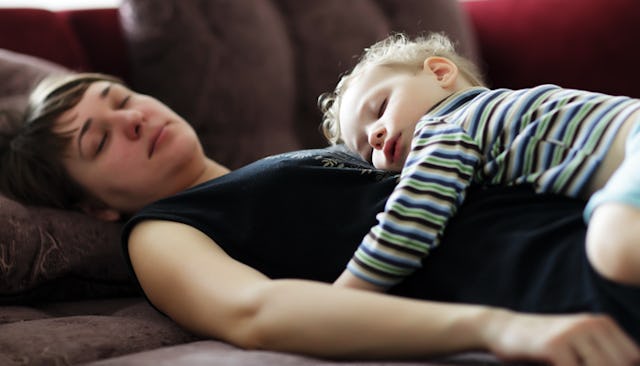A Letter To My Sons, On Postpartum Depression

Dear Boys,
I’m sorry.
I’m sorry I am not the mama I want to be for you. This is not what I imagined: this consuming sadness, this anger, this gray hopelessness I feel day in and day out. I want to be fun for you. I want to sing silly songs while we paint self-portraits. I want to chase you through sun-dappled parks; I want to catch crayfish and eat ice cream for lunch. I want to make playdough snakes, to glitter Pinterest projects, to celebrate Dress Like a Pirate Day in a tricorn hat and a corset.
But instead, some days, I struggle to get out of bed. I stumble through your breakfast; I turn on the television again. I can’t summon a song. My body hurts too much to chase you, and if my body doesn’t hurt, my heart does. I slog through the afternoon, too tired to for Pinterest projects. Everything is gray. I feel boxed-in, suffocated by it. This is not what I wanted for us. This is not what I wanted for you.
They call it postpartum depression. It’s a trick of hormones and chemicals, a misery of missed connections and neurons malfunctioning. I have forgotten, simply, how to be happy. Right now, happy is like a dream I half-remembered upon waking. Some days it’s closer than others, but it remains, always, out of reach.
My deep sadness is not because of you. It’s in spite of you, and that is, perhaps, the most cutting part. I am unshakeably, unutterably sad amidst the miraculous gift of you. I snap when I should laugh; I turn away when I should reach out. I make myself hug you, my darling, because my sadness makes me forget to. That forgetting makes me even sadder.
I am unhappy. But being unhappy doesn’t mean I am unhappy with you. Even in our roughest moments, in the times I shout at you because I’m so stressed and broken, I am happy with you. I love you even at your most exasperating. I love you when you’ve poured flour all over the kitchen; I love you when you’ve painted the dog. I love you when I wake up with you in the dark quiet of the night, again and again and again. I love you in the midst of my pain.
I love you in the dark, sweet one. Some days I don’t feel love, but empty space, and I go through the motions anyway. I am dimly comforted: love is an action, not a feeling. I pray my actions are enough for you.
There is no logic to this depression. There is no reason; there is no explanation other than a trick of chemistry, and no cure other than the same. I didn’t ask for this emptiness. This grayness sucks at me – everyone tells me to enjoy every moment of you. But how can I enjoy what I can’t see? How can I savor moments spent gasping for air?
These people who rhapsodize about how babies don’t keep – those people can’t see the choking grayness around me. They mean well, truly. But depression’s invisibility is part of its own special hell: a drowning woman looks like she’s paddling in the sunshine. And if she dare call for a life preserver, people might not help. They’ll say it’s her own fault. They’ll say she’s overreacting, that she’s got to ride out the hormones and the baby blues. And the worst fear: that the world mistakes depression for rejection. That if I really loved my babies, they will say, I would be happy.
I don’t need other people to say these things. I hear them every day, in depression’s own twisted voice.
This disease has robbed us both, my darling. It’s stolen time; it’s stolen feelings; it’s stolen the pinterest-perfect moments every other mother seems to have. But postpartum depression’s cruelest twist is also its greatest weakness. It may rob me of so many things, but it can never take you.
And no matter how dark it is, I have you to care for. I may feel empty, but I make sure you know love. My arms feel heavy, but I put them around you. I am exhausted, but I pick you up. I kiss you despite my pain. You are my strength, my darling. I want the best for you. The best is a mother, no matter how broken she is. And that mother is me.
I have you. I keep going. And in the end, that must be enough for us both.
Related post: The Cloud of Depression
This article was originally published on